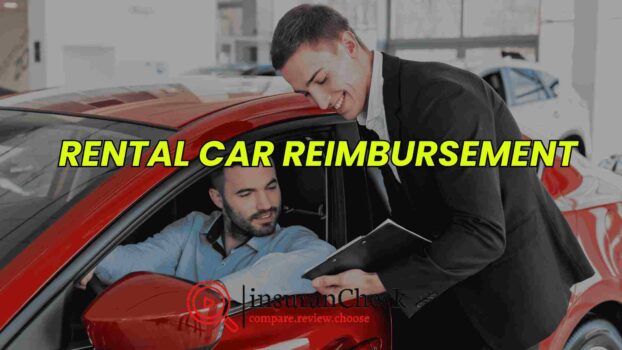Have you ever been without a car due to an accident or breakdown? It often leaves you wondering, “What now?” That’s where rental car reimbursement steps in. Interestingly, about 1 in 8 drivers file an auto insurance claim each year. This coverage kicks in to pay for a rental car while yours is being fixed. Let’s explore how it works and why it’s a crucial safety net.
What Is Rental Car Reimbursement Insurance?
Imagine you’re in an accident, and your car needs repairs. Rental reimbursement auto insurance steps in. It covers costs for a rental car or even public transport, like an Uber or city bus.
For instance, if your car is in the shop for a week, the insurance covers a rental car. Prefer a ridesharing service? No problem. The insurance still helps. Some policies even cover trains or light rail.
The good news is that there’s usually no deductible for this insurance. So, you don’t pay anything upfront. But, for collision or comprehensive coverage, there’s a deductible for car repairs.
Many insurers partner with rental companies. This means less paperwork for you. For example, with Geico and choosing Enterprise, billing can go directly to Geico. Simple, right? However, with non-partnered companies, you might pay upfront and get reimbursed later.
Not every vehicle qualifies for this insurance. Classic or antique cars often don’t. But, for standard cars, it’s affordable and hassle-free.
So, rental reimbursement auto insurance is more than a vacation perk. It’s essential for keeping life on track when your car is out of commission.
What Does Rental Reimbursement Typically Cover?
Rental car reimbursement is part of your auto insurance. It keeps you moving when your car is in the shop after a covered loss. Here’s what it includes and how it works.
Coverage for Rental Cars
This coverage pays for a rental car if your car is being repaired after an accident or other covered incident. If you have collision coverage and get into an accident, your rental reimbursement kicks in. It covers the rental car cost while your car is being fixed. This way, you can still get to work or run errands.
Alternative Transportation Costs
Rental reimbursement also covers more than just rental cars. If you prefer not to rent a car or it’s not practical, it helps with other transportation costs. This includes bus fares, subway rides, and even taxis or ridesharing services like Uber and Lyft. If your car is damaged by hail and you need to take public transit, you’re covered.
The Importance of Other Coverages
When you can use rental reimbursement, it depends on your other insurance types. For example, if your car is in a collision, you need collision coverage for it to be a covered loss. Similarly, for hail damage, you need comprehensive coverage. Without these, you might not get rental reimbursement.
Choosing Your Rental Company
Most policies let you choose your rental company. Some insurers partner with specific companies to make things easier. If you rent from a partner, they may bill your insurance directly. This means you won’t have to pay upfront. For instance, if you’re with State Farm and rent from Avis, State Farm might cover the cost directly.
If you choose a different company, you usually pay first and then get reimbursed. Though this process is a bit more work, it ensures you have transportation when you need it.
Rental reimbursement coverage is vital when your car needs repairs. It usually covers rental cars and other transport. This makes car repairs easier. Having the right mix of coverage is key to maximizing your policy benefits.
How Much Does Rental Car Reimbursement Coverage Cost?
Many wonder about the cost of rental car reimbursement coverage. Typically, it adds $35 to $60 yearly to your insurance. That’s about $2 to $5 a month. This small fee offers peace of mind. However, it’s vital to assess if it’s worth it for you.
Cost-Benefit Analysis
Spending $35 to $60 a year seems minor. Over ten years, it totals $350 to $600. This might seem high, especially since accidents happen roughly every decade. The Insurance Institute for Highway Safety (IIHS) says renting a car for two weeks costs between $350 and $1,000. This depends on the car and company. If you rarely need a rental, consider if the coverage cost outweighs the potential rental fee after an accident.
The Hidden Costs of Not Having Coverage
Think about what you’d do if your car broke down. If you need your car for work or daily tasks, costs can rise. The Bureau of Transportation Statistics shows that 86% of U.S. workers commute by car. This highlights how many depend on their vehicles. If you had to use public transport or ridesharing while your car is in the shop, those costs might exceed the coverage price.
Commercial Vehicles and Business Considerations
For businesses with a fleet, rental reimbursement is often a must. These vehicles are crucial for daily tasks. Not having a backup plan can be costlier than the coverage. This ensures smooth operations without delays.
Conclusion
Rental car reimbursement coverage is crucial during vehicle repairs. It usually costs $35 to $60 a year. This coverage is especially helpful for those who rely on their cars for work and daily activities. It covers rental and alternative transportation costs. About 1 in 8 drivers make claims each year. So, investing in this coverage prevents delays during car troubles. It offers a reliable safety net when needed.








